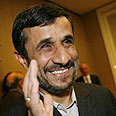
WASHINGTON – Iranian President Mahmoud Ahmadinejad's speech at the UN anti-racism summit in Geneva, in which he called Israel a racist state was vile and fed racial hatred but does not preclude US-Iranian diplomatic contacts, the United States said on Monday.
Ahmadinejad's speech prompted a walkout of a number of delegations during his speech, when he accused Israel of establishing a "cruel and repressive racist regime" over Palestinians.
"It does a grave injustice to the Iranian nation and the Iranian people, and we call on the Iranian leadership to show much more measured, moderate, honest and constructive rhetoric when dealing with issues in the region," he said.
The Geneva summit had already been badly undermined by a boycott by the United States and some of its major allies over concerns that it would be used as a platform for attacks against Israel.
"The comments that he made ... frankly feed racial hatred," State Department spokesman Robert Wood told reporters in Washington. "If Iran ... wants a different relationship with the international community, it's got to change its behavior and stop this horrible rhetoric."
Despite the criticism, the State Department said it was still looking to open diplomatic talks with Iran in keeping with US President Barack Obama's policy of engagement.
The United States hopes a dialogue may persuade Iran to rein in its atomic program, which Washington suspects is a cover to obtain nuclear weapons and which Tehran says is to generate power so it can export more of its oil and gas.
Asked if Ahmadinejad's comments ruled out a US-Iranian dialogue, Wood replied: "I am not precluding it
because we have said very straightforwardly that we want to have direct diplomacy with Iran."
US attempts to ease tensions with Iran have also been clouded by the sentencing of an Iranian-American journalist, Roxana Saberi, to eight years in prison on spying charges.
Secretary of State Hillary Clinton on Monday called for Saberi's speedy release and said she had been subjected to process that was "nontransparent, unpredictable, arbitrary."
On Sunday, Ahmadinejad urged Tehran's general prosecutor to ensure that the 31-year-old freelance reporter enjoyed full legal rights to defend herself.
Reuters contributed to this report















